The Twentieth Anniversary of the International Riversymposium
Bill Dennison ·Heath Kelsey, Simon Costanzo and I traveled to Brisbane, Australia to participate in the International Riversymposium. One of the things I most appreciate about the Riversymposium is the overall quality of the plenary talks, and this year’s symposium was no exception. The major theme of this year’s Riversymposium was the ten-year anniversary of the Brisbane Declaration on the importance of environmental flows. This declaration was formulated during the 2007 International Riversymposium. To celebrate this anniversary, the 2017 International Riversymposium intended to revise the Brisbane Declaration. Professor LeRoy Poff from Colorado State University introduced this subject in the conference’s beginning plenary, followed by Dr. Eloise Kendy from the Nature Conservancy in Montana. Throughout the conference, attendees contributed their comments on the Brisbane Declaration, which will be collated and used as revisions.
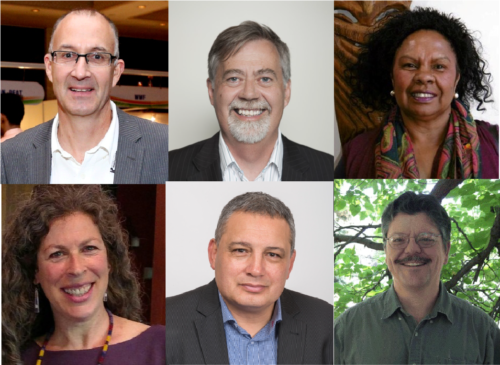
Other plenary talks focused on rivers and water. We had two amazing plenary talks from indigenous people, Dr. Anne Poelina from the Fitzroy River in Western Australia and Gerrard Albert from the Whanganui River in New Zealand. These talks were the most thought-provoking and meaningful in their descriptions of issues associated with native people’s relationships with rivers that I have ever experienced. Anne showed us a fantastic film and spoke eloquently about her relationship with the Fitzroy River. The other speaker, Gerrard, spoke softly and passionately about the Whanganui River in such a way that the giant auditorium we were in seemed to vanish, and it felt as though we were having a personal conversation. Other plenary speakers included Bill Young, an Australian who works at the World Bank in Washington, DC, and David Papps, the Australian Commonwealth Environmental Water Holder. Bill Young gave an information-rich talk about water security. David Papps provided some pithy remarks that only a man nearing retirement could make.
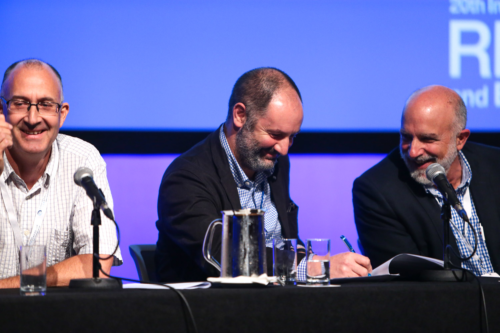
I also enjoyed an evening event called Women in Water. My former student and longtime colleague, Dr. Eva Abal, chaired this event. She had gathered an impressive panel of young and experienced women who talked about their perspectives and roles in the water management realm. I also participated in a session called ‘Riverprize: What does it take to win, and what are the benefits?’ This session panel included Riverprize winners and judges.
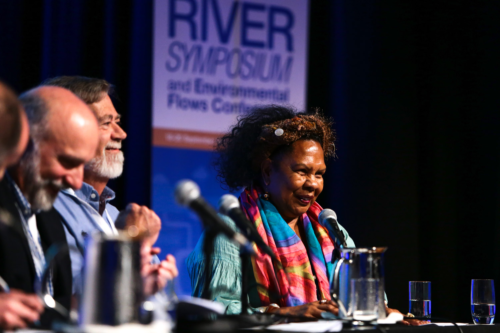
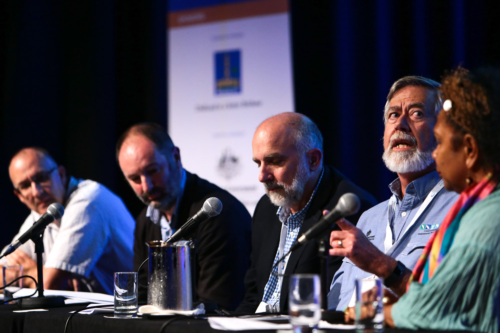
I also participated on a panel in the session organized by the Queensland Reconstruction Authority on building resilience into the flood responses. The other panelists were Paul Sayers from the University of Oxford who talked about the ten golden rules for flood management, Chris Spray from the University of Dundee who talked about breaking river boundaries since floods are the source, pathway and receptor of water, and Lauren Zielinski, winner of the 2017 Emerging River Professional Award, who spoke as the Lorax from the Dr. Seuss book, speaking for the floods, and reminding us that they are an important, natural process.
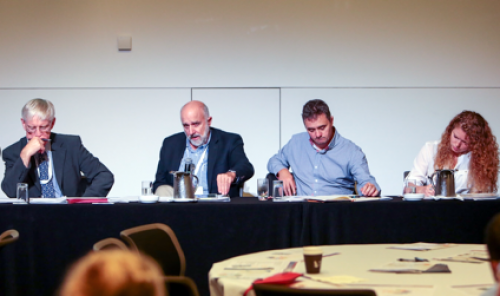
I spoke about how flooding can lead to societal learning moments, based on my personal experiences with floods. I used an example from the Dayton, Ohio 1913 flood, which had a private capital campaign to build dams with the slogan “Remember the promises you made in the attic!” Another example I gave contained the 2003 inundation of coastal areas of Chesapeake Bay associated with Hurricane Isabel. This flood led us to hold a conference, write a book, and develop public signage about relative sea level rise. The 2005 disaster associated with Hurricane Katrina in New Orleans and rural Louisiana led to the state of Louisiana developing an aggressive 2012 Master Plan, which I helped to co-chair with the Science and Engineering Board. In 2011, I experienced the Brisbane flood as part of my sabbatical with the International Water Centre, and this flood led to a suite of newsletters and public talks.
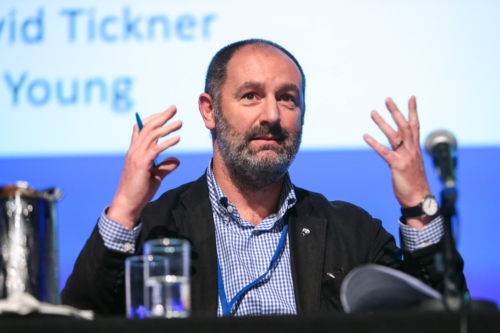
We had a tongue-in-cheek hypothetical panel to close out the conference. The theme of the hypothetical was “Waterways of 2050 — How did we get here and can we move forward to a better future?” Stuart Bunn chaired the panel, which included Anne Poelina, David Papps, David Tickner, Bill Young and me. My facetious contribution to the debate was to argue that removing dams provided an opportunity for a real estate boom, especially in golf courses. I always enjoy the opportunity to leave the Riversymposium with a smile.
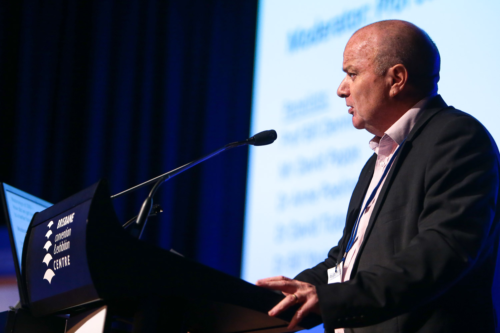
I am already looking forward to the next International Riversymposium, which will be held in Adelaide, Australia in October 2018. The theme of next year’s Symposium will be “Rivers for All,” which is eerily similar to the newly coined name of our WWF-UMCES partnership: “Healthy Rivers for All.”
As part of the Queensland Restoration Authority session, I wrote the following song adaptation.
Who’ll Stop the Rain
Credence Brownwater Revival
20 Sept 2017
Long as I remember the rain been coming down.
Clouds of myst'ry pouring confusion on the ground.
Good people through the ages, trying to find the sun;
And I wonder, still I wonder, who'll stop the rain.
I went down to the river, seeking shelter from the storm.
Caught up in the flood, I watched the misery grow.
Too much impervious surface, not enough planning
And I wonder, still I wonder who'll stop the rain.
Heard the climate’s changin’, how we need resilience.
It is getting more urgent, we need to act now.
Still the rain kept pouring, falling on my ears.
And I wonder, still I wonder who'll stop the rain.
Graeme and Rachel are in the most flood prone state
Paul promotes 10 golden rules, Chris promotes golden governance
Lauren promotes golden flooding, I promote this silly song
And I wonder, still I wonder, who’ll stop the rain.
Images used with permission by the International River Foundation.
About the author
Bill Dennison

Dr. Bill Dennison is a Professor of Marine Science and Vice President for Science Application at the University of Maryland Center for Environmental Science.